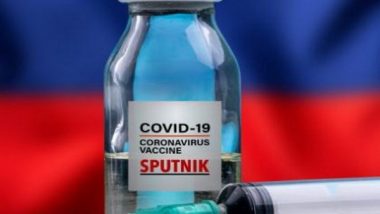Moscow, August 23: The Philippines' Food and Drug Administration approved the single-component Sputnik Light coronavirus vaccine under the emergency use authorization procedure on Monday, the Russian Direct Investment Fund said.
"The approval of Sputnik Light by the regulatory authorities of the Philippines allows for expanding national vaccine portfolio through adding another Russian coronavirus vaccine, which has demonstrated safety and high efficacy in many countries. A single-shot Sputnik Light has efficacy higher than that of many foreign two-dose vaccines and enables to vaccinate more people in a shorter time frame," CEO of the Russian Direct Investment Fund (RDIF) Kirill Dmitriev said in a statement.
Also Read | Afghanistan Crisis: Prices of Hijab and Turban Increase With Taliban’s Return.
Sputnik Light vaccine based on human adenovirus serotype 26 is the first component of the Sputnik V vaccine. Russia’s Single-Dose Sputnik Light COVID-19 Vaccine Approved for Use in Mauritius.
"Immunization with Sputnik Light will help the Philippines to significantly reduce the infection rate in the country and create herd immunity in a short time frame," RDIF added.
In March 2021, the two-dose Sputnik V vaccine was approved in the Philippines under the emergency use authorization procedure. To date, Sputnik V has been authorized in 69 countries with a total population of over 3.7 billion people.
"Sputnik Light is safe and highly effective as demonstrated by the real-world vaccination data in a number of countries. In particular, the data from the Ministry of Health of the Buenos Aires province (Argentina) shows 78.6-83.7 per cent efficacy among the elderly. In Paraguay Sputnik Light is 93.5 per cent effective during the ongoing vaccination campaign according to the country's Ministry of Health," RDIF said.
Studies on the combination of Sputnik Light with other vaccines are ongoing in Argentina, Azerbaijan, UAE and have been approved in Russia and Belarus.
Sputnik Light has proven effective against all new strains of coronavirus, as demonstrated by the Gamaleya Center during laboratory tests and is compatible with standard vaccine storage and logistics requirements.
(This is an unedited and auto-generated story from Syndicated News feed, LatestLY Staff may not have modified or edited the content body)













 Quickly
Quickly




















